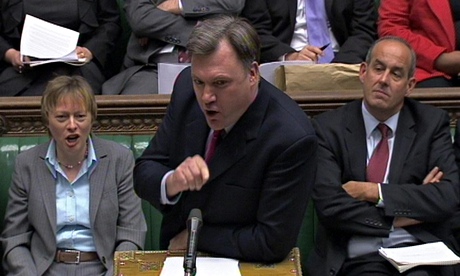
There is decency left in public life after all! In the course of an evening at the Mansion House in which he announced some bizarre budgetary targets, George Osborne found the time to pay a warm tribute to his long-time antagonist, former shadow chancellor Ed Balls. Not only that: there was spontaneous applause in honour of the man who, but for the unexpected result of the election, would have been standing in Osborne’s place, unveiling a somewhat more appealing economic strategy.
As my dear friend the late Alan Watkins used to say: “Politics is a rough old trade.” But I have noticed since the election that the dignitaries of the City of London are not alone in expressing, alas somewhat belatedly, their admiration for Mr Balls.
Indeed, it is a truth now widely acknowledged that the nation in general, and the present government in particular, owe a lot to Balls. He was the most important influence in keeping Britain out of the eurozone, and the driving force behind making the Bank of England independent.
Moreover, with the man who originally hired him in 1992, one Gordon Brown, Balls played a major role in establishing the reputation for “prudence” which enabled the Labour party under the duumvirate of Tony Blair and Brown to increase investment in public services.
It all ended in tears with the financial crash – which, it cannot be repeated often enough, was not caused by the public spending of which Cameron and Osborne approved at the time, but by a banking “system” that had spun completely out of control.
We now find Labour suffering its own great depression, amid endless soul-searching and, on the part of at least one candidate for the leadership, a series of statements which make one wonder why they don’t just own up and join the Conservatives.
I say “soul-searching” advisedly, for, whatever else the party does in the face of defeat, it must not lose its soul. And, for all the maliciously “helpful” suggestions it is receiving from certain commentators, this does not necessitate a great lurch to the right.
Labour has always been the party of the oppressed. In the early days, and for decades after, so many people could be categorised as underdogs that Labour’s “natural constituency” was enormous. That has changed; I have a distinct memory of some Labour figure once saying that, if society evolved in the way the party’s founders hoped, they might end up with a majority feeling comfortable enough to vote Conservative. To coin a phrase, socialism, not capitalism, might contain the seeds of its own destruction.
Thus it was interesting to read in a Times article that when party adviser Stewart Wood was asked by Gordon Brown why he had joined the party, he replied: “To help the bottom 25%.” To which Brown responded: “Yes, but we mustn’t say that or we will never win.”
There lies the explanation for all the “prudence” and clandestine attempts at redistribution – although, given the tendency of globalised capitalism to widen the gap between rich and poor, it was often a case of preventing the gap becoming worse rather than actually narrowing it.
But it is Osborne’s declared purpose to indulge in another bout of cuts, not just to “welfare” but in the public services generally. Interestingly, in a fundamentally laudatory article about David Cameron last week, his former tutor, Professor Vernon Bogdanor, warns that Cameron’s “big society” faces two problems. “The first is whether it offers sufficient succour to the victims of Conservative policies directed towards a smaller state and retrenchment in public spending … The second and deeper problem with the ‘big society’ is that it conflicts with the economic liberalism to which Conservatives are also committed.”
Now, there has been much media coverage about the £12bn of welfare cuts in the offing; rather less of the £8bn of tax cuts the Tories promised during the campaign. Beneath all this “one nation” soft soap there is a basic strategy: take benefits away from the needy and cut direct tax rates further.
It did not surprise me when Nigel Lawson re-entered the fray last week with a call for a cut in the top rate of income tax from 45% to 40%. It was he who reduced the top rate from 60% to 40% in the 1988 budget. Once again he tells us it would cost virtually nothing. I seem to recall similar claims in 1988, when the small print of the budget report put the cost at £8bn.
It was all part of Margaret Thatcher’s, and Lawson’s, mission to liberalise the economy, and was supposed to be the solution to the UK’s economic problems. So it is with excellent timing that Cambridge economists Ken Coutts and Graham Gudgin have produced a volume of research – The Macroeconomic Impact of Liberal Economic Policies in the UK – which finds that, for all the earlier problems with unions and high taxation, the most important economic indicators, including growth in GDP per head, were no better in the post-1979 decades than before.
I end with a wonderful example of the perverse impact of “the cuts”. There is a village in the home counties where council cuts have meant that a bush in front of a speed camera has not been, well, “cut”, and the camera cannot take photographs. Not trimming the hedgerows saves money; not being able to collect speeding fines does the reverse.

